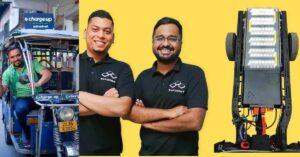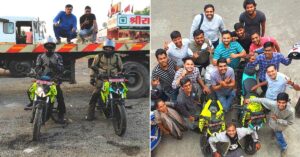Why Do EVs Catch Fire? Startup Makes Batteries to Fight the Risk, Earns Rs 18 Cr/Year
Among the advantages of Neuron Energy's lithium-ion battery product line are the microprocessor-based BMS, the four temperature sensors, the appropriate cell spacing for thermal management, and the Neuron App for remote assistance.
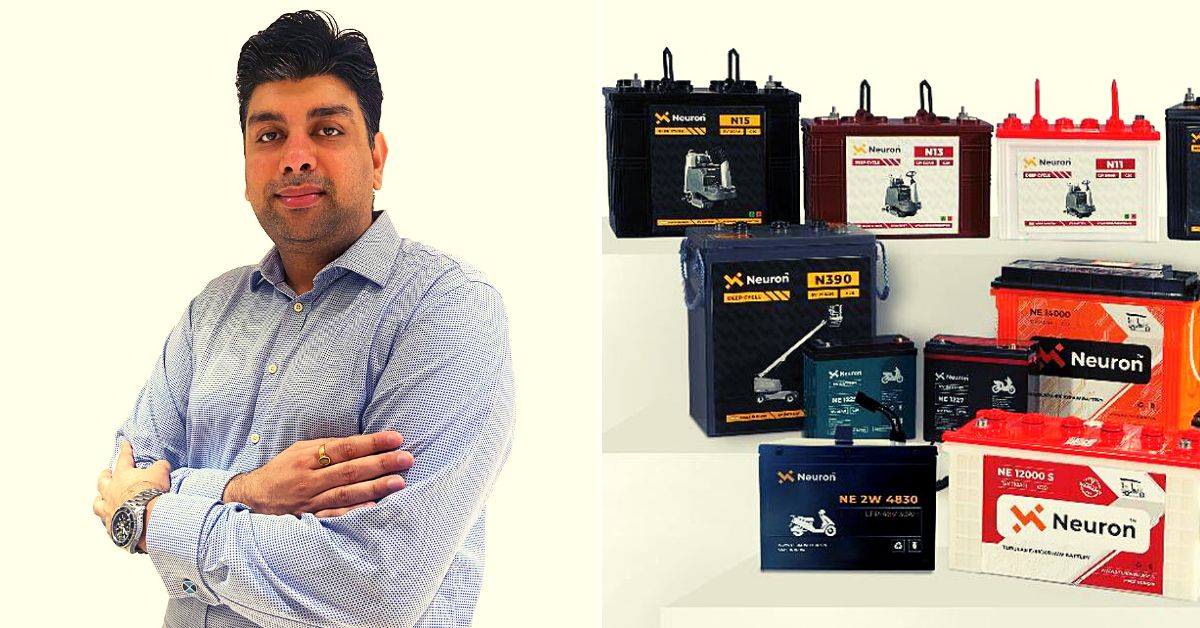
Pratik Kamdar has long advocated for using fire-resistant grade battery materials along with superior BMS (Battery Management System) and best-quality cells to stop vehicles from catching fires.
“If you employ the right quality of cells and the correct type of BMS, the risk of an EV catching fire reduces significantly,” says Pratik, the co-founder of Neuron Energy, in a conversation with The Better India.
Neuron Energy is a Mumbai-based startup which manufactures lithium-ion and lead acid batteries for electric vehicle (EV) makers. Pratik co-founded this venture with fellow entrepreneur Raj Shah in 2018.
At Neuron, they minimise the risk of their batteries catching fire by employing A-grade EV cells and a smart microprocessor-based BMS. Furthermore, Pratik claims that Neuron was the first venture in India to introduce a microprocessor-based BMS in two and three-wheeler EVs.
“We have been proactively promoting this ideology that we should use a smart microprocessor-based BMS because it has a higher current carrying capacity and accuracy. Using this smart BMS, if the temperature cut off of the battery is set at 60 or 65 degrees Celsius, it will automatically shut down at that temperature. That’s not the case with other types of BMS, resulting in a poorer response to variations in temperature,” explains Pratik.
“Also other types of BMS, particularly of the MOSFET (metal-oxide-semiconductor field-effect transistor) variety, don’t really control the functioning of the battery pack. But a smart microprocessor-based BMS really controls the battery back. Multiple algorithms and settings are put in play to control the performance of the battery pack,” he adds.
A battery pack manufactured by Neuron has four core temperature sensors. “In the last two years, we have been selling battery packs with core temperature sensors wherein once the battery cell temperature touches 60 degrees Celsius, the BMS automatically cuts off power to the battery. Once it reduces to 55 degrees Celsius, the BMS can kickstart it,” he notes.
In addition, the startup also emphasises appropriate cell spacing for thermal management and runs a Neuron App for remote assistance.
Now, the government has also come out with Automotive Industry Standards (AIS)-156 (Phase 1, Amendment 3) norms, which they have made compulsory.
“As per this norm, each battery pack in India must have core temperature sensors and also a microprocessor-based BMS just like the ones we manufacture. In addition, the government has also mandated an extruded IP67-rated aluminium enclosure for any EV battery pack,” he says.
Assembling and manufacturing battery packs
Like all manufacturers of EV battery packs in India, Neuron also imports cells. Once these cells are imported, they are sorted as per their internal resistance (IR). Cells having similar IRs are batched together and used in a single battery pack. Once sorting is done, they are taken through a grading process and put in cyclers, where one charge and discharge cycle is run.
“In total, we run five such cycles before we use a cell in our battery pack. In other words, a battery cell is charged and discharged five times just to weed out any issues with it. Following this, the accurate cells that have been taken from the grader in-house are used in a battery pack, where a cell holder and other items are put in place as well. Once the cells are stacked together in a battery module and the busbar (solid metal bar used to carry current) is created as per the output we require of the battery pack, we perform the welding process,” explains Pratik.
“After this, these modules go into the assembly and we assemble the pack — modules are put into a metal box or aluminium extrusion with padding on the side. We then construct an extruded IP67-rated aluminium enclosure for the battery pack, after which we go into testing and ageing. We do a full charge and discharge cycle of the battery pack,” he adds.
They run a cycle to check whether the pack is operating normally or not. It goes through an ageing test wherein they see whether there is no cell imbalance, all cells are properly functioning, etc. Except for importing the cell, everything else is done in-house. It takes about 15–20 days from the moment they acquire cells to convert them into a battery pack.
It’s imperative to note that nearly all fires are due to short circuits leading to uncontrolled currents. These short circuits happen because of poor cell quality, shoddy battery design (how say 12 cells are packaged and connected to build a battery pack with a capacity of 3kWh), and poor BMS wherein cells aren’t adequately managed with the right sensing and software intelligence.
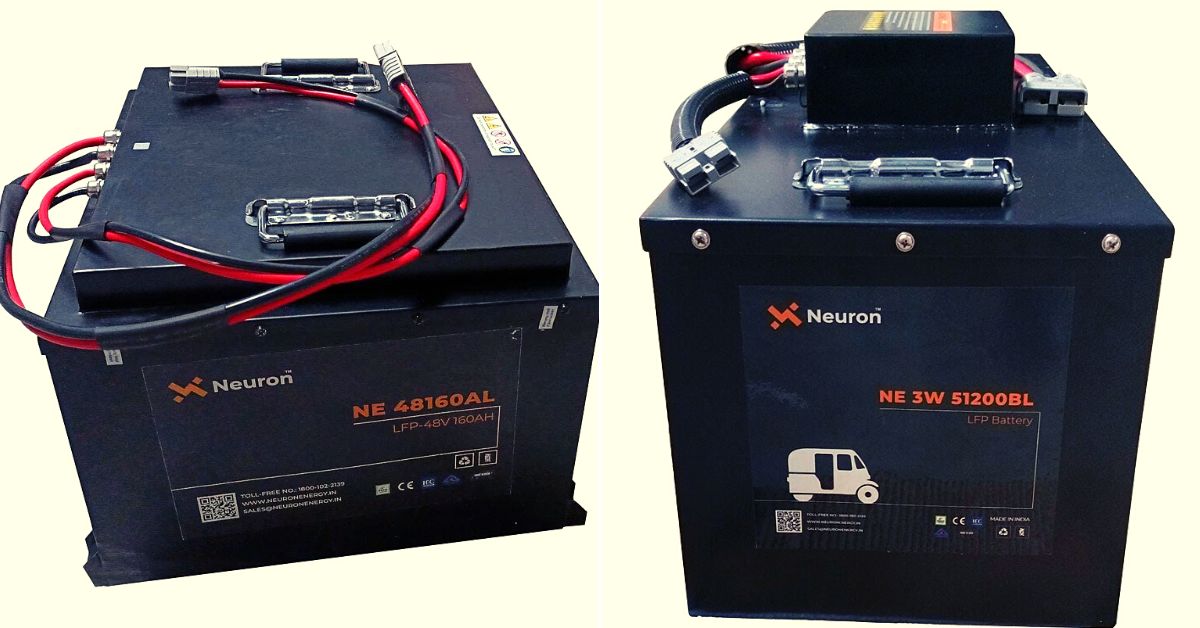
For two and three-wheelers
In an announcement made yesterday, Neuron Energy stated that they plan to invest Rs 50 crore in the Li-Ion battery pack segment. Under their Li-ion segment, they manufacture LFP (lithium ferro-phosphate)-chemistry and NMC (nickel, manganese, cobalt)-chemistry battery packs.
“We supply an entire range of batteries for two and three-wheelers. For two-wheelers, we have battery packs for passenger, commercial and loader segments, which include e-scooters, high-speed bikes and loaders. In the e-rickshaw segment, we have loader and passenger vehicles. In the loader segment, we make 10 kWh and 15 kWh lead acid battery packs,” says Pratik.
Specifications of battery packs manufactured by Neuron Energy include 60.8V 30Ah (2 kWh battery pack), 73.6V 42Ah (3 kWh battery pack), 73.6V 60Ah (5 kWh battery pack for an e-motorcycle), 51.2V 200Ah (10 kWh battery pack for loader, e-rickshaw) and 51.2V 100Ah (5 kWh battery pack for passenger three-wheelers), among others.
“We are contract-manufacturing all the batteries. Our contract manufacturer’s facilities are based out of Pune and Noida. Neuron owns and purchases the raw materials. The entire sourcing and supply chain is handled by us. We have a contract manufacturing partner who converts that to the battery pack as per our design. We oversee the quality check and PDI, and the entire process of assembly has been put in place by our team. Once that is done, we push out our products,” says Raj.
“The reason why we haven’t invested in a plant or a lot of machinery yet is that the industry is changing very rapidly. Given the many uncertainties in the market in terms of whether NCM or LFP is in demand or whether OEMs require 1.5 kWh or 2 kWh battery packs, we decided to tie up with a manufacturer who has an empty assembly and extra capacity. We lease that space out and if we require any extra machinery, we will install it ourselves. We remain asset-light but control the entire process of manufacturing and supply chain. We are careful about using only A-grade cells and smart BMS so that we don’t go down on quality,” he adds.
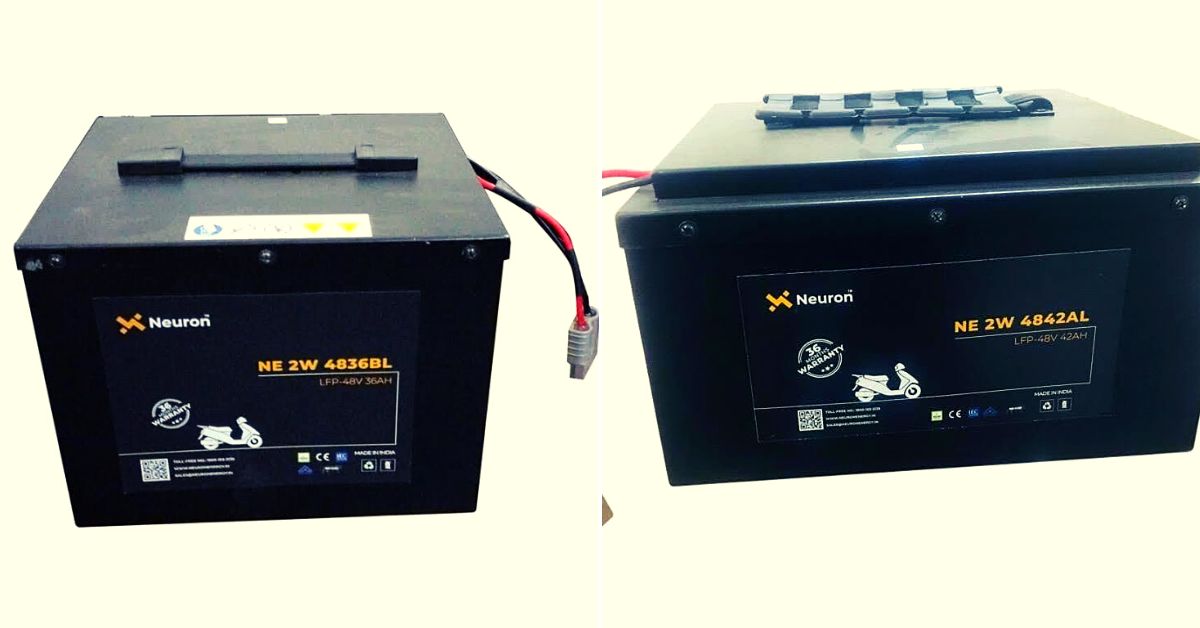
Looking ahead
For two-wheelers, Pratik claims that Neuron Energy manufactures 60,000 battery packs. Next year, they are planning to scale this up to 1,20,000.
“In the last financial year, our revenue was Rs 18.6 crore from the EV lithium battery segment. As a result of the pandemic, we shut down our factory manufacturing lead acid batteries for EVs and tied up with another manufacturer in Haryana. This year our objective is to cross Rs 100 crore in revenue, and the year after that, we are eyeing Rs 200–250 crore. Last year, we lost the first three months to the second wave of COVID-19 which also shut down our lead acid battery assembling factory. In total, we have around 120 distributors to feed across Delhi, UP, Bihar, Jharkhand and West Bengal, besides OEMs who are buying from us,” claims Pratik.
Today, India has about 14 crore two-wheelers on the road, of which EVs amount to 10–12 lakhs. Before the pandemic, the NITI Aayog proposed that the government should stop the registration of internal combustion engine (ICE)-driven three-wheelers by 2023 and two-wheelers under 150cc by 2025. “If that happens, the scope for business growth is immense,” he notes.
“We are currently bootstrapped, but are planning to raise Rs 50 crore in funding and we have a clear roadmap to touch a topline of Rs 1,000 crore in the next five years. We are supplying batteries to OEMs like Komaki, 3EV (one of the largest players in the loader segment for three-wheelers doing last-mile delivery for companies like Amazon, Flipkart, etc.), YC Electric (key passenger segment player for three-wheelers), Kinetic and other top players,” he adds.
(Edited by Pranita Bhat)
(All images courtesy Neuron Energy)
If you found our stories insightful, informative, or even just enjoyable, we invite you to consider making a voluntary payment to support the work we do at The Better India. Your contribution helps us continue producing quality content that educates, inspires, and drives positive change.
Choose one of the payment options below for your contribution-
By paying for the stories you value, you directly contribute to sustaining our efforts focused on making a difference in the world. Together, let's ensure that impactful stories continue to be told and shared, enriching lives and communities alike.
Thank you for your support. Here are some frequently asked questions you might find helpful to know why you are contributing?


This story made me
-
97
-
121
-
89
-
167






